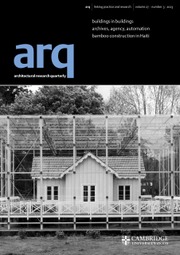Article contents
A Primitive exchange: on rhetoric and architectural symbol
Published online by Cambridge University Press: 24 March 2005
Extract
In relating stories about origins that recall an idealized ‘Primitive’ condition, Vitruvius seeks legitimacy for judgement about architecture. At issue is the problem of authority, and Vitruvius is anxious about authority, and about order. Vitruvius' audience for his story of the Primitive dwelling, as for the rest of his treatise, the Ten Books on Architecture, is the emperor Octavian, introduced in the dedicatory preface as ‘imperator Caesar.’ His book to Caesar asserts a commonplace among rhetoricians, that authority is sought in a distant past, and in exemplars, useful precedents that promise a perfect work. ‘Décor,’ writes Vitruvius, ‘demands the faultless ensemble of a work composed, in accordance with precedent, of approved details. It obeys convention, which in Greek is called thematismos, or custom or nature’ (trans Granger, 1983, I.2.5). The task of the orator was to ‘demonstrate’ (demonstratio) that authority, and so for architecture, in his mythmaking and concern to demonstrate the truth of his opinions, Vitruvius establishes that the task of architecture is the representation of order.
- Type
- Theory
- Information
- Copyright
- © 2004 Cambridge University Press
- 2
- Cited by




